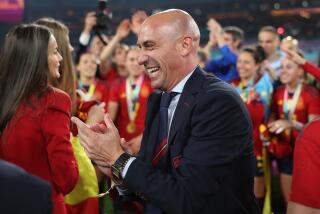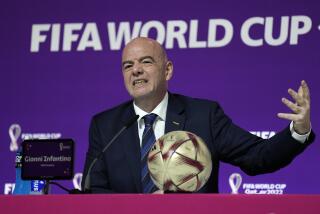FIFA Officials Call for President’s Resignation
FIFA, soccer’s international governing body, was left in disarray Friday when its general secretary, Michel Zen-Ruffinen, delivered a 30-page condemnation of the organization.
In a confidential report to FIFA’s 24-member executive committee, Zen-Ruffinen alleged corruption, misleading accounting practices and conflicts of interest so serious that they might lead to criminal charges being filed against some executive committee members.
Stunned by the revelations, five of seven FIFA vice presidents attending the 10-hour, closed-door meeting in Zurich, Switzerland, immediately called for the resignation of Joseph “Sepp” Blatter, FIFA’s president.
Blatter, who is running for a second four-year term, refused to step down, claiming that only the 204-member FIFA Congress, which meets in Seoul on May 29, has the right to dismiss him.
“It is time for FIFA to clean its house,” Zen-Ruffinen, a 44-year-old lawyer and former referee, said during a news conference after the day-long meeting. “This is a serious report, with serious allegations.”
Blatter, who had tried to bring his attorney into the meeting, only to be rebuffed, said he would reply in writing to the allegations within seven days.
Blatter, a 66-year-old former Swiss banker and army colonel who is locked in a bitter struggle with Issa Hayatou of Cameroon, president of the Confederation of African Football (CAF), for control of FIFA, has claimed the fuss is merely election-year politics.
“In election time people try to find things that can touch other people,” he said. “But taking the FIFA president apart is not easy to do.”
But FIFA Vice President Chung Mong-Joon of South Korea said Blatter had run roughshod over the rules, especially when he suspended an internal audit of FIFA’s finances that had been ordered by the executive committee in the wake of the bankruptcy of FIFA’s marketing partner, ISL/ISMM.
“FIFA is facing the most serious integrity problem as an organization since its foundation [in 1904],” Chung said.
Zen-Ruffinen went even further in his denunciation, claiming that two executive committee members, whom he declined to identify, had acted unethically, if not illegally.
“I do not want to go into detail, but two people have been bought,” he told Reuters. “It wasn’t a case of the president being bought, but it was a case of the president buying. In one of the cases, an instruction was given on behalf of the president. The second one was a direct payment.”
At day’s end, the executive committee voted to reinstate the internal audit, but only after the World Cup, May 31-June 30 in Japan and South Korea.






